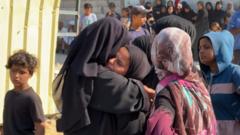The Gaza Humanitarian Foundation's recent initiative to hold a women-only aid distribution day led to a horrific scene as two women were fatally shot amidst chaos. This tragic event highlights the ongoing dangers faced by civilians seeking aid in war-torn Gaza, raising serious concerns about humanitarian practices in the region.
Chaos and Tragedy: Women-Only Aid Distribution Claims Lives in Gaza

Chaos and Tragedy: Women-Only Aid Distribution Claims Lives in Gaza
A designated women-only aid distribution in Gaza ended in tragedy as two women were killed while seeking food assistance amid escalating chaos and violence.
The Gaza Humanitarian Foundation (GHF) recently announced a women-only food aid distribution, promising a safer environment for women seeking assistance in war-ravaged Gaza. However, what was meant to be a day of support devolved into tragedy when two women, Mary Sheikh al-Eid and Khadija Abu Anza, were shot and killed amid chaotic scenes that unfolded at the distribution site.
The move to hold a women-only day arose from concerns over the frequent violence that has marred regular aid distributions since the GHF was established with backing from Israel and the US. Social media posts inviting women to collect food boxes were intended to create a controlled and secure environment, as men historically faced the brunt of violence while seeking aid.
Mary Sheikh al-Eid, desperate to provide food for her seven children following her husband's death, decided to attend the distribution, believing fewer people would be present. Her sister Khawla recounted the chaos that ensued upon their arrival, with a massive crowd of women struggling to receive aid, ultimately leading to police using pepper spray and stun grenades to disperse them. In the ensuing panic, the sisters were separated, leading to the horrific news that Mary had been shot in the head.
Khadija Abu Anza met a similar fate; she was fatally struck by a bullet while trying to collect aid with her sister, as they were confronted by Israeli security forces. The chaos from what was intended as a supportive initiative ultimately resulted in yet more civilian casualties in a conflict that has already led to thousands of Palestinian deaths.
Critics have decried the GHF distribution system as ineffective and dangerous, with the United Nations refusing to work with the organization, dubbing its operations unethical in the shadow of ongoing military control. Despite Israeli assertions that the GHF was necessary to prevent aid diversion by Hamas, reports have revealed a severe spike in civilian deaths since the initiative's implementation, as people are forced into dangerous situations just to procure food.
The deaths of Mary and Khadija have prompted an outcry for urgent reform in aid distribution practices in Gaza. Humanitarian officials stress that a comprehensive influx of aid is essential to prevent widespread starvation as international law mandates the protection of civilian lives in occupied regions. As the situation in Gaza continues to deteriorate, calls for accountability in the aid system grow louder, with many warning that the GHF represents a "death trap" rather than a lifeline.


















